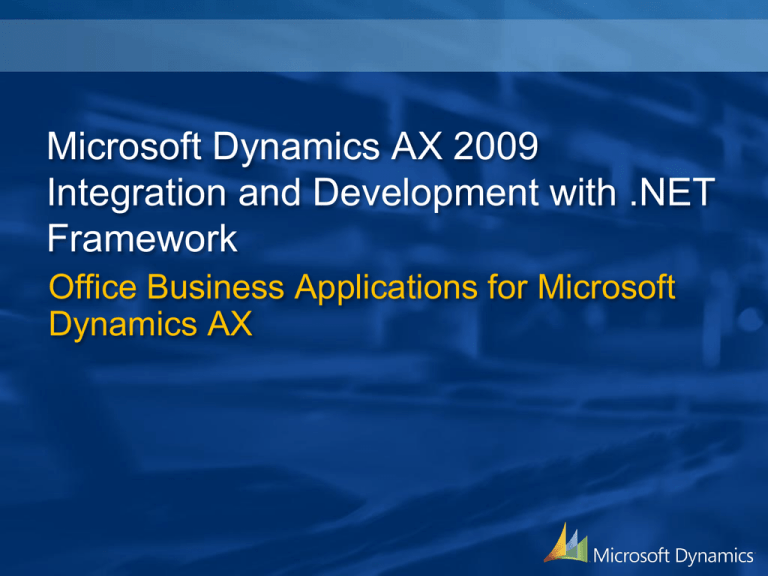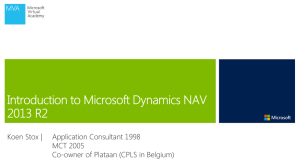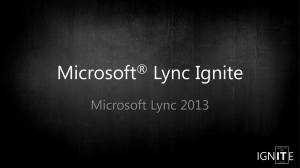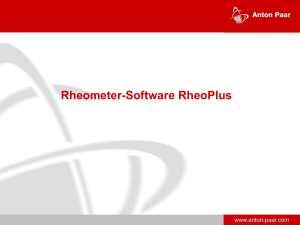
Microsoft Dynamics AX 2009
Integration and Development with .NET
Framework
Office Business Applications for Microsoft
Dynamics AX
Agenda
• Introduction to Office Business Applications (OBA)
for Microsoft Dynamics
– Business Problem
– Introducing Office Business Applications
– Deployment
• Development Side of Office Business Applications
– Visual Studio Tools for Microsoft Office
– Microsoft Dynamics AX .NET Business Connector
Microsoft Dynamics AX 2009
Integration and Development with .NET
Framework
Introduction to Office Business Applications
Business Problem
• Recent research studies showed:
– 85% of employees in an organization are not licensed
for business management systems
– Of the 15% that are, just over half of them actually use it
• About 93% of employees have no direct access to
data regarding their business
• The systems meant to enhance workflow and
decision-making throughout the organization are
left to a small group of power users, dramatically
diminishing ROI
Introducing Office Business Applications
OBAs:
• Bring together front office and
back office
• Make ERP systems more
accessible
• Make information actionable by
information workers through the
familiar, powerful, and ubiquitous
Microsoft Office System
• Built on the Office Business
Application Platform
Microsoft
Office
System
Line-ofbusiness
Applications
What are OBAs for Microsoft Dynamics?
Office Business Applications for Microsoft
Dynamics are designed to connect information
workers with Microsoft Dynamics information from
within the Microsoft Office Suite
Microsoft Dynamics Snap
Microsoft Dynamics Snap applications are OBAs
designed to connect Line of Business (LOB)
systems with the people that use them through the
familiar user interface of Microsoft Office.
Snap Applications Available Today
Snap
Allows you to…
From
within:
Business Data
Search
Search for unstructured data across ERP,
CRM and SharePoint sites
Outlook
Business Data
Lookup
Search for and insert Dynamics data into the
document, spreadsheet or email you are
working on
Word,
Excel,
Outlook
Custom Report
Generator
Export and analyze Dynamics data in Excel,
upload changes back to the system
Excel
Timesheet
Management
Report your time directly from your Outlook
calendar
Outlook
Vacation
Management
Create, submit, approve/reject, and track
status and history of vacation requests
Outlook
Expense
Management
Create, submit and approve/reject expense
reports
Excel,
SharePoint
Customer
Journal
Capture customer data for offline meetings
then upload any relevant changes
InfoPath
OBA Deployment Architecture
Client Side
VSTO 2008
Microsoft Office
Office Add-Ins
Microsoft Dynamics AX 2009 .NET Business Connector
Server Side
Microsoft Dynamics AX AOS
SQL Server
OBA Deployment Options
Office Client-based add-ins:
- Work with Outlook, Word, Excel, and InfoPath
- Deployed via SMS or Group Policy
- Versions specific to the Microsoft Office 2007 system
and the 2003 Microsoft Office system
- ClickOnce deployment technology
Office SharePoint Server-based add-ins:
- Built for Microsoft Office SharePoint Server 2007
- Support a single SharePoint Server deployment
Demo
Retrieve Customer Information to Excel
Development Side of OBA for
Microsoft Dynamics AX
OBA Development: Client Platform Investments
•
•
Ribbon
Core
Features
•
Task
Pane
•
Application add-in
•
•
.NET Business
Connector
Application
Integration
Framework
Microsoft Dynamics AX
Open XML File Format
Enhanced add-in model
Customizable User Interface
• Custom ribbon, ribbon designer
• Custom task panes
Word
• Custom XML, data binding
Excel
• BI functions, server support
Outlook
• Unified object model
OBA Development: Server Platform Investments
•
Office SharePoint Server 2007
•
•
Office SharePoint
Server
•
•
•
Windows SharePoint
Services
Windows SharePoint Services
•
•
•
•
ASP.NET
SQL
Excel Services
InfoPath Forms Services
Business Data catalog
Content management
ASP.NET integration
Workflow support
Content types and meta data
Feature and solution deployment
Client + Server = Powerful Solutions Platform
Office
Business
Applications
Dynamics AX
ISV OBAs
Business
Intelligence
Content
Management
2007 Office system clients
Open XML File Formats and Extensible Fluent Interface
• Search
• Workflow
• Business Data Catalog
• Website & Security Framework
• Excel Services
Microsoft Dynamics AX
.NET Business Connector
Office
Communications
Server 2007
Office SharePoint Server 2007
Exchange Server
2007
Microsoft
Office System
Microsoft Dynamics AX Application Integration
Framework
Dynamics AX
Microsoft Visual Studio Tools for Office
…
Unified Communication
& Collaboration
Custom OBAs
OBA Apps as
a Reach
Channel
Application
Generated
Tasks &
Notifications
Document
Integration
2007
Microsoft
Office
System
Collaborative
Site
Discovery
Navigation
Composite
User
Interface
Complementary
Document
Workflow
Real-World Cases
Customers and ISVs
Common OBA Patterns
Technologies
• Microsoft Visual Studio 2008
• Visual Studio Tools for Microsoft Office 2007
• New InfoPath form or Project/Excel/Word Add-Ins
• Add controls in forms, write event handlers
• Microsoft Dynamics AX 2009 AIF or Business
Connector
• Used to interface with Microsoft Dynamics AX
2009
What is VSTO?
• Makes Office a valuable, first-class project type in VS
• Enables developers to create and extend OBA
• Enables developers to leverage key Office UI features
and support collaboration and workflow
• Provides Office developers with advantages of the VS
professional development environment
• Allows developers to leverage existing programming skills
• Developers can leverage their company’s current
investment in Office 2003 Pro and new investment in
2007 Office system
Some Examples
Basic Features of VSTO
• Visual designers for key UI features
• Workflow and Microsoft SharePoint support
• Data-bound Word Content Controls
• App-level add-ins for most client programs
• Doc-level add-ins for Excel and Word 2007
• ClickOnce deployment and security
Basic Features of VSTO
Ribbon Designer
Ribbon Editor
Ribbon Control
Toolbox
Property
Grid
VSTO Runtime Components
VSTO Runtime
Office Host
Unmanaged
Runtime
Loaders
DefaultDomain
Managed Runtime
•Check security
•Fetch updates
•Create appdomain
•Connect Office host
•Host item controls
•Managed controls
AppDomain #2
Usercode
Add-in/#3
AppDomain
Doc
Usercode
customization
Add-in/
Doc
customization
Building Task Panes
• Deliver additional data to the user to act upon or
integrate within Office documents
• OBA Intelligent Document Pattern
• Two types of panes:
– Actions Pane
• Associated with a specific
Word or Excel document
– Custom Task Pane:
• The same general idea as
Actions Pane, only on the
application add-in level,
not an individual document
Task Pane Persistence Models
• Actions Pane
• Custom Task Pane
How to Program Ribbon and Task Pane Interaction
•
•
•
Implement a custom task pane
Declare global variable which will indicate state of your task pane
visibility in ThisAddin class
Implement methods which will manipulate your task pane in
ThisAddin class:
AddTaskPane method:
ctpCustTaskPane = this.CustomTaskPanes.Add(new CustTaskPane(), "Caption");
ctpCustTaskPane.VisibleChanged += new EventHandler(CustTaskPane_VisibleChanged);
ctpCustTaskPane.Visible = true;
RemoveTaskPane method:
this.CustomTaskPanes.Remove(ctpCustTaskPane);
•
Implement Ribbon callbacks in your Ribbon class
– Toggle task pane visibility inside “Click” handler of
RibbonToggleButton control
Outlook Form Regions
• Additive UI enhances Outlook’s built-in forms
• Adjoining and Separate Regions for both custom
and built-in forms
• Regions are created in Outlook Forms Designer
• Forms solution implemented via Add-in
• Deployment via Windows registry
Outlook Form Regions
• VSTO 3.0 simplifies and speeds up Outlook form region design
and configuration process with a visual designer and a wizard
–
–
–
–
–
Achieve maximum form region design flexibility with VS visual designer
Configure your form region with a simple, intuitive wizard
Run and debug your form region right from VS (F5)
No need to manually handle manifest XML, OFS files, registry entries, etc.
Option to import Outlook-created OFS file
VSTO Deployment
The deployment process involves the following
considerations:
•
•
•
•
•
Office solution requirements
Deploying an Office solution
Installing an Office solution
Updating an Office solution
ClickOnce cache
What is .NET Business Connector?
• Standalone Microsoft Dynamics AX component
• Set of managed classes that provide easy access
to X++ functionality in Microsoft Dynamics AX
Characteristics
• Requires Microsoft® Windows® authentication
• Automatically registered during installation
• Can be used to implement and deploy both clientbased applications, such as Microsoft
Office add-ins and server-based applications
• Has a Business Connector Proxy user, which
"acts-on-behalf-of“ Microsoft Dynamics AX users
who cannot be fully authenticated
Business Connector Architecture
The Business Connector run-time
interactions
Managed classes
Transition layer
Interpreter layer
Managed Classes
The following managed classes are provided by the .NET
Business Connector:
• Axapta
• AxaptaBuffer
• AxaptaContainer
• AxaptaObject
• AxaptaRecord
• VariantWrapper
All these classes are found in the namespace:
Microsoft.Dynamics.BusinessConnectorNet, and assembly
Microsoft.Dynamics.BusinessConnectorNet (in
microsoft.dynamics.businessconnectornet.dll which is
located in the Bin directory in the Microsoft Dynamics AX Client
directory)
Examples of Usage
Axapta ax = new Axapta();
ax.Logon(CompanyName, Language ,ObjectServerName,Configuration);
ax.Logoff();
Declare variable instance of Axapta class
Call Logon() method. Parameters are: name of company, language, Applciation
Object Server name, and path to configuration file. For default values pass null
Logoff method disconnects from AOS
AxaptaRecord axRecord = ax.CreateAxaptaRecord("InventTable");
axRecord.ExecuteStmt("select * from %1 where %1.ItemGroupId == 'RawMat'");
Declare variable instance of AxRecord class
ExecuteStmp receives x++ statement
and executes it
Example of Realization
…
using Microsoft.Dynamics.BusinessConnectorNet;
…
Axapta ax;
String invItemNameField = "ItemName";
Object invItemName;
String invItemIdField = "ItemId";
Object invItemId;
// Log on.
ax = new Axapta();
try
{
ax.Logon(null, null, null, null);
}
catch (Exception)
{
Console.WriteLine("Exception occurred");
}
Console.WriteLine("*** List inventory item records");
AxaptaRecord axRecord = axCreateAxaptaRecord("InventTable");
// Execute a query.
axRecord.ExecuteStmt("select * from %1 where %1.ItemGroupId == 'RawMat'");
// Loop through matching Dynamics AX records.
while (axRecord.Found)
{
invItemName = axRecord.get_Field(invItemNameField);
invItemId = axRecord.get_FieldinvItemIdField);
Console.WriteLine(invItemId + "\t“ + invItemName);
axRecord.Next();
}
axRecord.Dispose();
// Log off of Dynamics AX.
ax.Logoff();
Sources of Additional Information
• Office Business Applications Developer Portal
http://msdn2.microsoft.com/en-us/office/aa905528.aspx
• Office Solution Development Overview
http://go.microsoft.com/fwlink/?LinkId=60064
• Office Solution Architecture Overview
http://go.microsoft.com/fwlink/?LinkId=60065
• .NET Business connector
http://msdn2.microsoft.com/en-us/library/aa834438.aspx
Demo
Develop OBA for Microsoft Dynamics AX
Q&A
Introducing the Lab
• In this lab you will:
- Create a new VSTO project based on Excel 2007 add-in
template
- Create custom task pane
- Create connector class for Microsoft Dynamics AX and
Excel integration
- Create new Excel template
© 2008 Microsoft Corporation. All rights reserved.
This presentation is for informational purposes only. Microsoft makes no warranties, express or implied, in this summary.








